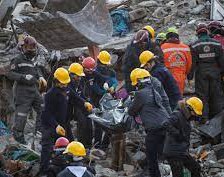Some 400 footwear factories were destroyed in the cluster of Antakya during the two earthquakes, with respective magnitudes of 7.8 and 7.7, that hit southern Turkey and northwestern Syria on Feb. 6. 2023, according to Berke Içten, the chairman of the association of Turkish footwear manufacturers, TASD , Türkiye Ayakkabı Sanayicileri Derneği. [About 400…- Shoe Intelligence - EDM Publications]
The plants represent about 10 percent of the country’s manufacturing capacity, pointed out Içten. Turkey has about 10,000 footwear manufacturers employing some 350,000 people with an annual production capacity of around 550 million pairs. The country’s main footwear clusters are Istanbul, Izmir, Konya, Gaziantep, Antakya and Adana.
Gaziantep and Adana were also hit by the earthquakes, but the footwear facilities located in those cities are “safe,” underlined Içten.
The facilities in Antakya are largely small or medium-sized employing on average about 20-25 people, representing an estimated workforce of about 10,000 people, Içten told Shoe Intelligence. The cluster specializes in men’s leather shoes.
The people employed in the factories “are experienced workers. We don’t know how many were lost,” explained Içten, noting that some of them lived in the mountains flanking Antakya, an area less affected by the tremors.
“Some people have left the region but if we are fast in rebuilding they will return,” he said, stressing the importance of convincing people to remain in the area to avoid losing skilled workers who are crucial to relaunch the cluster. After the Micam trade show held in Milan from Feb. 19 to 22, TASD will be sending a delegation to Antakya.
TASD has already started collecting funds, along with other associations such as Aysad, which represents suppliers to the footwear industry, and Tasev, the Turkish Footwear Industry Research Development and Education Foundation, with the support of the Turkish government to finance the reconstruction of factories in Antakya.
“Even though I loathe to use the word in the current circumstances, the situation could be an ‘opportunity’ to build larger production facilities by convincing manufacturers to aggregate through cooperatives,” explained Içten.
He noted that there are no examples of cooperatives in the Turkish footwear industry but the legal framework is in place and such organizations already exist in other industries such as agriculture. He highlighted that any business combination would be done on a voluntary basis and the new Antakya cluster could become a “model” for other footwear districts in the country.
He noted that Antakya’s public infrastructure also has to be rebuilt but he was confident that this could be done rapidly thanks to Turkey’s “strong” construction industry.
“To restart working is important to boost morale and maintain people in the region,” commented Içten.
TASD is also negotiating procurement contracts with government agencies and companies, such as Turkish Airlines, to generate business that could help relaunch production in Antakya. No contract has been signed yet but the association has received positive feedback.


